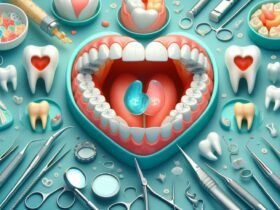Table of Contents
Living a healthy life isn’t just about eating right or exercising—it’s about feeling good inside and out. When you take care of your health, you can enjoy life more and have better relationships with others. This article will guide you through some of the best health tips to help you live a happier, healthier life.
Key Takeaways
Building Stronger Relationships Through Health


Investing Energy in Family and Friends
When you feel good physically and mentally, you have more energy to invest in your family and friends. Exercising with your partner is not only a fun way to get in shape, but it also helps you feel better about yourselves, which, in turn, strengthens your relationship. Spending quality time together can lead to stronger, more meaningful connections.
Creating Meaningful Connections
Healthy habits can help you build better relationships. When you are healthy, you are more likely to be happy and positive, which makes it easier to connect with others. Simple activities like going for a walk or cooking a healthy meal together can create lasting memories and deepen your bonds.
Community Involvement for Better Health
Being involved in your community can also improve your health. Volunteering or participating in local events can give you a sense of purpose and belonging. It can also help you meet new people and build a support network. Community involvement is a great way to stay active and engaged, which is important for both your physical and mental health.
Starting Your Health Journey: Tips for Beginners
Embarking on a health journey can be both exciting and challenging. Here are some tips to help you get started on the right foot.
Setting Manageable Goals
Begin with small, achievable goals. If you’re new to exercising, start with short walks and gradually increase the duration. Similarly, if you want to eat healthier, try adding one serving of fruit or vegetables to your meals each day. Discovering the ‘why’ behind your goals can help you stay motivated and focused.
Tracking Your Progress
Keep a record of your journey. Use a journal, the best diet app, or a simple checklist to track your daily activities and how you’re feeling. Seeing your progress over time can be a great motivator and can help you identify what’s working well and what might need adjustment.
Embracing Patience and Kindness
Understand that change takes time. It’s normal to have days where you don’t go for a walk and rest instead, or enjoy a slice of cake at a celebration. Be patient and kind to yourself. Remember, the journey to health is personal and unique to you.
Embrace the process and celebrate small victories along the way. Your health journey is a marathon, not a sprint.
The Importance of Education in Health


Understanding Nutrition Basics
Learning about nutrition is key to a healthy life. Knowing what to eat helps you make better choices. A balanced diet includes fruits, vegetables, proteins, and grains. Avoiding too much sugar and fat is also important. When you understand nutrition, you can plan meals that keep you strong and healthy.
Learning About Exercise Benefits
Exercise is not just for athletes. Everyone can benefit from being active. Regular exercise helps your heart, muscles, and mind. It can be as simple as walking or as fun as dancing. Staying active can improve your mood and energy levels. Knowing the benefits of exercise encourages you to move more.
Mental Wellbeing and Health Education
Mental health is just as important as physical health. Learning about mental wellbeing helps you understand your feelings and how to manage stress. Activities like meditation and talking to friends can boost your mental health. Education in mental health teaches you to take care of your mind, just like you do with your body.
Incorporating Healthy Habits into Daily Life


Incorporating healthy habits into your daily life can make a big difference in your overall well-being. Here are some tips to help you get started:
Hydration and Its Benefits
Staying hydrated is crucial for your health. Drinking enough water helps your body function properly, keeps your skin looking good, and can even improve your mood. Aim to drink at least 8 glasses of water a day. You can also get hydration from foods like fruits and vegetables.
Choosing Nourishing Foods
Eating a balanced diet is key to maintaining good health. Focus on incorporating a variety of whole foods into your meals. This includes fruits, vegetables, whole grains, and lean proteins. Avoid processed foods that are high in sugar and unhealthy fats. You can even take a nutrition class online free to learn more about making healthier food choices.
The Role of Regular Exercise
Regular exercise is essential for a healthy lifestyle. It helps you maintain a healthy weight, boosts your mood, and improves your overall fitness. Aim for at least 30 minutes of moderate exercise most days of the week. This can include activities like walking, cycling, or even dancing. You can find resources at a healthy habits store to help you stay motivated and on track.
Making small changes in your daily routine can lead to big improvements in your health. Start with one habit at a time and gradually build on it. Remember, the journey to better health is a marathon, not a sprint.
By focusing on these areas, you can create a more balanced and holistic nutrition plan that supports your overall well-being.
The Impact of a Healthy Lifestyle on Mental Wellbeing
Exercise and Mood Enhancement
Regular exercise can release feel-good hormones, which can enhance mood and reduce feelings of depression and anxiety. Physical activity helps in managing stress and improving overall emotional stability.
The Importance of Quality Sleep
Getting a good night’s sleep is crucial for mental health. Aim for 7-9 hours of quality sleep each night to help your body repair itself and your brain process information from the day. Quality sleep can improve cognitive functions like memory and concentration.
Nutrition and Brain Health
A nutritious diet supports mood regulation by providing the key building blocks for neurotransmitters like serotonin and dopamine. Eating a variety of fruits, vegetables, whole grains, and lean proteins can positively impact brain health and overall mental wellbeing.
Exploring the Benefits of Outdoor Activities
Connecting with Nature
Spending time in nature can lead to a healthier lifestyle by improving your mood and even lowering stress hormones. Make it a priority to spend time at a park, walking through nature trails, or on the beach regularly to help reduce stress and improve your health.
Vitamin D and Sunlight
Getting enough sunlight is essential for your body to produce vitamin D, which is important for bone health and immune function. Just 10-30 minutes of midday sunlight several times a week can make a big difference.
Outdoor Exercise Options
Outdoor activities like hiking, biking, and running not only provide physical benefits but also mental well-being. These activities can be more enjoyable and less monotonous than indoor exercises, making it easier to stick to a regular routine.
Discover the wide-ranging benefits of regular outdoor activities, including physical health improvements, mental well-being, and enhanced social interactions.
Spiritual Habits for Overall Wellbeing


Meditation and Mindfulness
Meditation and mindfulness are powerful tools to reduce stress and improve focus. Start with just a few minutes each day and gradually increase the time. These practices can help you feel connected to something greater than yourself and provide a sense of calm and clarity in your life.
Finding Peace in Nature
Spending time in nature can be incredibly soothing. Whether it’s a walk in the park or a hike in the mountains, being outdoors can help you feel more grounded and at peace. This connection with nature can also boost your energy levels and help you feel more refreshed.
Activities That Provide Purpose
Engaging in activities that give you a sense of purpose can be very fulfilling. This could be anything from volunteering in your community to pursuing a hobby you love. These activities can help you feel more energetic and reduce feelings of brain fog or tiredness.
Feeling tired, needing more energy, experiencing brain fog, or just feeling blah? Would you ever consider these symptoms are impacting your spiritual life?
By incorporating these spiritual habits into your daily routine, you can improve your overall wellbeing and lead a more balanced life.
Conclusion
Living a healthier life doesn’t have to be complicated. By making small, manageable changes, you can improve your physical and mental well-being. Remember, it’s important to be patient with yourself and celebrate your progress, no matter how small. Building healthy habits takes time, but the benefits are worth it. You’ll have more energy, feel happier, and be better equipped to handle life’s challenges. So start today, and take the first step towards a healthier, happier you.
Frequently Asked Questions
How can I start my health journey?
Begin with small, achievable goals. For example, start with short walks if you’re new to exercise. Gradually add more healthy foods like fruits and vegetables to your meals.
Why is it important to track my progress?
Tracking your progress helps you see how far you’ve come and keeps you motivated. It can also help you figure out what’s working well and what needs to change.
What should I know about nutrition?
Understanding the basics of nutrition is important. Eating a variety of foods, including fruits, vegetables, whole grains, and lean proteins, helps your body get the nutrients it needs.
How does regular exercise benefit my mental health?
Regular exercise can improve your mood and reduce feelings of stress and anxiety. Physical activity releases feel-good hormones that can help you feel happier.
Why is staying hydrated important?
Drinking enough water is essential for your body’s functions, like digestion and temperature regulation. Staying hydrated helps you feel better overall.
How can I incorporate healthy habits into my daily life?
Make small changes, like drinking more water or taking short walks. Gradually add more healthy habits, and be patient with yourself as you adjust to a healthier lifestyle.














Leave a Review